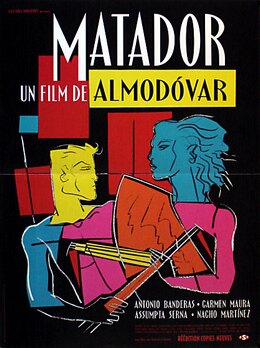
MATADOR
Spain, 1986, 106 minutes, Colour.
Assumpta Serna, Antonio Banderas, Bibi Andersen, Carmen Maura.
Directed by Pedro Almodovar.
Matador was written and directed by Pedro Almodovar - after his initial period with small-budget experimental features and just prior to his international success with Women on the Verge of a Nervous Breakdown. He was to go on to make such successful films as High Heels, Tie Me Up, Tie Me Down, Kika and Flower of My Secret.
Almodovar has a very strong cast led by Assumpta Siena and Carmen Maura, two of Spain's best-known local and international actresses. The film also features a young Antonio Banderas, who had appeared in a number of Almodovar's earlier films - and has gone on to international success.
The film takes a number of Spanish themes and uses symbolism of bullfighting. The film explores violence, passion, sexuality, religion. This is possibly the most serious of Almodovar's films, yet it has quite a strong ironic touch, satiric exaggeration to make its point. (It is interesting to note that it is one of the few films to offer a critique of the Catholic Church organisation Opus Dei, which had an enormous growth during the '80s and '90s, especially with the backing of Pope John Paul II.)
The film, while interesting in itself, is particularly interesting in looking at the development of Almodovar and his interests and styles in his films.
1.The impact of the film? The work of Almodovar? His career, cinematic style, cinematic plots and issues? A bravado and bravura style?
2.The Spanish film industry of the '80s? The post-Franco developments? Style, themes - and a brashness and a frankness in reaction to the Franco period? The atmosphere of Spain, Spanish culture, Spanish cities, sport, religion?
3.The colour photography, the visual style, editing, the intercuts? Musical score?
4.The title and its reference to Diego? The relationship of Angel and Maria to the matador? Real matadors and Diego's career? Reputation? The symbolic matador? Sex, passion, lust, power, violence, blood and death - and the aftermath of the matador's skilful fighting and killing of the bull?
5.A Spanish treatment of sexuality and passion? Public and private?
6.The reality of bullfighting in Spanish culture? As sport, as culture? As a symbol for masculine skill and dominance? The film offering explanations, rehearsals? Diego's career and his memories? His matador life? The relationship with Angel and his wanting to learn? Abilities, inabilities? The patronage of Diego?
7.The character of Diego, in himself, as a man, macho attitudes? His successful career, reputation? As a teacher? His befriending Angel, training him, using him? Their conversations - and Diego's suggesting how Angel should live and react and relate? The relationship with Eva? The violence and the lust? Diego and the deaths, his responsibility? Angel's confession? Maria, her admiration for Diego, the growing fascination, the discovery of the truth about his murders, the torrid affair? Their talk, their explanations - and the irony and graphic nature of their death in passion?
8.Maria, a Spanish woman, her macho attitudes? Lawyer? Her relationship with her victims? The brutality, yet skill, of her murders? Angelo's mother? The relationship with Angelo? The police and the investigations? Her double life? Admiration for Diego, the relationship with him? The passionate affair - and her desire to kill him? The confessions? The passion and death?
9.Eva, as a model, her relationship with Diego? Her relationship with Angel? The brutality of the rape? Her reaction, the mother, the police and the explanations? The subsequent relationship with Diego and Angel? At work, Scarlet, overhearing the information, the ultimate violence?
10.The character of Angel? At home, the dominance of his mother, her devout Catholicism, the background of Opus Dei and its style, exclusivism, religious elitism? Angel and his listening to others, unsure of himself, trying to prove himself? The patronage of Diego, the admiration? Trying to prove himself? The encounter with Eva, the brutality of the rape? His own sexual identity - and probing of homosexuality? His confessing to the police - his belief in confession, he ecclesiastical background of confession? Prison? The dominance of his mother and his relationship with her, with Maria? His confusion, ambitions, dreams? His sanity? Where he was left at the end? Who controlled him? The father figure, the mother, religion and the church, Spanish culture, sex?
11.The portrait of Angel's mother, her harshness, the sequences at home, domination of her son, religious ideals and their imposition?
12.Julia, psychologist? Her examination of Angel, the discussions, her report?
13.The police, their listening to Angel, the investigation, the use of Maria? Angel's confession and the police not believing him?
14.The film as drama, as psychodrama? Almodovar and his use of symbols, voyeurism - and his self-conscious reference to other movies? A cinematic psychodrama?